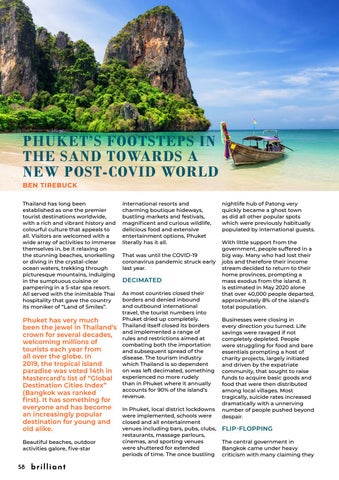PHUKET’S FOOTSTEPS IN THE SAND TOWARDS A NEW POST-COVID WORLD BEN TIREBUCK Thailand has long been established as one the premier tourist destinations worldwide, with a rich and vibrant history and colourful culture that appeals to all. Visitors are welcomed with a wide array of activities to immerse themselves in, be it relaxing on the stunning beaches, snorkelling or diving in the crystal-clear ocean waters, trekking through picturesque mountains, indulging in the sumptuous cuisine or pampering in a 5-star spa resort. All served with the inimitable Thai hospitality that gave the country its moniker of “Land of Smiles”.
Phuket has very much been the jewel in Thailand’s crown for several decades, welcoming millions of tourists each year from all over the globe. In 2019, the tropical island paradise was voted 14th in Mastercard’s list of “Global Destination Cities Index” (Bangkok was ranked first). It has something for everyone and has become an increasingly popular destination for young and old alike. Beautiful beaches, outdoor activities galore, five-star
58
international resorts and charming boutique hideways, bustling markets and festivals, magnificent and curious wildlife, delicious food and extensive entertainment options, Phuket literally has it all. That was until the COVID-19 coronavirus pandemic struck early last year.
DECIMATED As most countries closed their borders and denied inbound and outbound international travel, the tourist numbers into Phuket dried up completely. Thailand itself closed its borders and implemented a range of rules and restrictions aimed at combating both the importation and subsequent spread of the disease. The tourism industry which Thailand is so dependent on was left decimated, something experienced no more rudely than in Phuket where it annually accounts for 90% of the island’s revenue. In Phuket, local district lockdowns were implemented, schools were closed and all entertainment venues including bars, pubs, clubs, restaurants, massage parlours, cinemas, and sporting venues were shuttered for extended periods of time. The once bustling
nightlife hub of Patong very quickly became a ghost town as did all other popular spots which were previously habitually populated by international guests. With little support from the government, people suffered in a big way. Many who had lost their jobs and therefore their income stream decided to return to their home provinces, prompting a mass exodus from the island. It is estimated in May 2020 alone that over 40,000 people departed, approximately 8% of the island’s total population. Businesses were closing in every direction you turned. Life savings were ravaged if not completely depleted. People were struggling for food and bare essentials prompting a host of charity projects, largely initiated and driven by the expatriate community, that sought to raise funds to acquire basic goods and food that were then distributed among local villages. Most tragically, suicide rates increased dramatically with a unnerving number of people pushed beyond despair.
FLIP-FLOPPING The central government in Bangkok came under heavy criticism with many claiming they





























